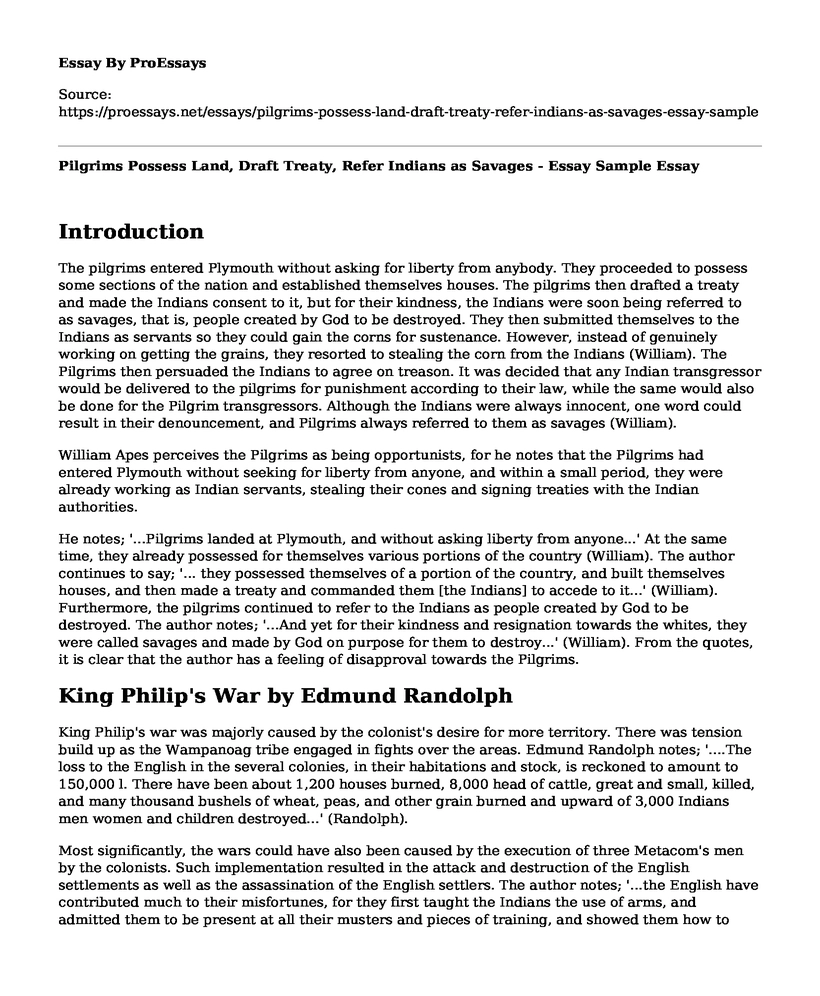Introduction
The pilgrims entered Plymouth without asking for liberty from anybody. They proceeded to possess some sections of the nation and established themselves houses. The pilgrims then drafted a treaty and made the Indians consent to it, but for their kindness, the Indians were soon being referred to as savages, that is, people created by God to be destroyed. They then submitted themselves to the Indians as servants so they could gain the corns for sustenance. However, instead of genuinely working on getting the grains, they resorted to stealing the corn from the Indians (William). The Pilgrims then persuaded the Indians to agree on treason. It was decided that any Indian transgressor would be delivered to the pilgrims for punishment according to their law, while the same would also be done for the Pilgrim transgressors. Although the Indians were always innocent, one word could result in their denouncement, and Pilgrims always referred to them as savages (William).
William Apes perceives the Pilgrims as being opportunists, for he notes that the Pilgrims had entered Plymouth without seeking for liberty from anyone, and within a small period, they were already working as Indian servants, stealing their cones and signing treaties with the Indian authorities.
He notes; '...Pilgrims landed at Plymouth, and without asking liberty from anyone...' At the same time, they already possessed for themselves various portions of the country (William). The author continues to say; '... they possessed themselves of a portion of the country, and built themselves houses, and then made a treaty and commanded them [the Indians] to accede to it...' (William). Furthermore, the pilgrims continued to refer to the Indians as people created by God to be destroyed. The author notes; '...And yet for their kindness and resignation towards the whites, they were called savages and made by God on purpose for them to destroy...' (William). From the quotes, it is clear that the author has a feeling of disapproval towards the Pilgrims.
King Philip's War by Edmund Randolph
King Philip's war was majorly caused by the colonist's desire for more territory. There was tension build up as the Wampanoag tribe engaged in fights over the areas. Edmund Randolph notes; '....The loss to the English in the several colonies, in their habitations and stock, is reckoned to amount to 150,000 l. There have been about 1,200 houses burned, 8,000 head of cattle, great and small, killed, and many thousand bushels of wheat, peas, and other grain burned and upward of 3,000 Indians men women and children destroyed...' (Randolph).
Most significantly, the wars could have also been caused by the execution of three Metacom's men by the colonists. Such implementation resulted in the attack and destruction of the English settlements as well as the assassination of the English settlers. The author notes; '...the English have contributed much to their misfortunes, for they first taught the Indians the use of arms, and admitted them to be present at all their musters and pieces of training, and showed them how to handle, mend and fix their muskets, and have been furnished with all sorts of arms by permission of the government....' (Randolph).
Interracial insensitivities could have also played a role in spurring up King Philip's war. The New England natives had decided to strike back following the cultural disintegrations, diseases, and death that they had experienced. King Philip then formed a military alliance to attack the Swansea. The attack destroyed twelve England towns. The author records; '...Faced with death, disease, and cultural disintegration, many of New England's native peoples decided to strike back. Over the next year, both sides raided villages and killed hundreds of victims. Twelve out of ninety New England towns were destroyed' (Randolph)
Works Cited
Digital History, http://www.digitalhistory.uh.edu/disp_textbook.cfm?smtID=3&psid=649.
Cite this page
Pilgrims Possess Land, Draft Treaty, Refer Indians as Savages - Essay Sample. (2023, Feb 27). Retrieved from https://proessays.net/essays/pilgrims-possess-land-draft-treaty-refer-indians-as-savages-essay-sample
If you are the original author of this essay and no longer wish to have it published on the ProEssays website, please click below to request its removal:
- The Age of the Late Renaissance in England Essay
- Contrabands During the Civil War Essay Example
- Paper Example on Balkans: Colonial Rule & Call for Independence
- Paper Example on Ovid: Celebrated Roman Poet and Artist's Influential Legacy
- Korean and Vietnam Wars Comparative Essay Example
- 19th Century's Most Significant Event: Haitian Independence - Essay Sample
- Cell Phone Revolution - Free Essay Sample







